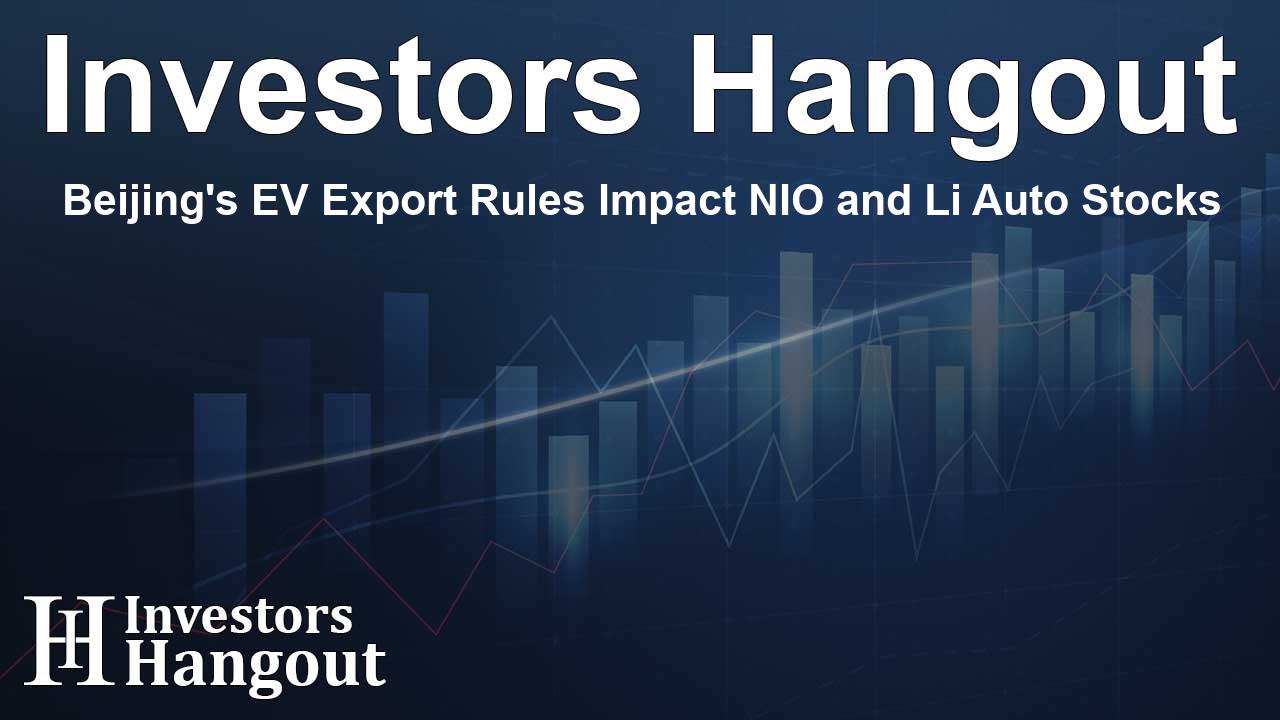Beijing's EV Export Rules Impact NIO and Li Auto Stocks

Beijing Implements Stricter EV Export Regulations Affecting Stocks
Recently, Chinese electric vehicle (EV) stocks NIO (NYSE: NIO) and Li Auto (NASDAQ: LI) have experienced a notable decline following announcements regarding new regulations by Beijing aimed at tightening the export of EVs.
New Export Permit Requirements
Effective from January 1, the Ministry of Commerce in China will enforce mandatory permits for automakers before they can export electric vehicles. This policy introduces a formal measure to help promote what officials describe as the "healthy development" of the rapidly growing EV industry.
Aligning EV Regulations with Traditional Vehicles
This initiative mirrors current export regulations imposed on traditional vehicles and motorcycles. According to reports, this adjustment aims to create parity between the treatment of electric and conventional vehicle markets.
Market Conditions and Industry Oversight
The timing of these regulations coincides with a tumultuous period for the industry, characterized by a significant price war among competitors. Beijing's regulatory bodies have responded by limiting the extent of heavy discounting practices and urging car manufacturers to expedite payments to their suppliers, all in an effort to stabilize the financial landscape of the sector.
Stock Performance Despite Challenges
Despite the ongoing challenges, 2024 has seen positive momentum in the Chinese EV stock market. NIO, for example, has seen its stock rise by more than 61% in recent months. Other players like XPeng Inc. (NYSE: XPEV) noted a remarkable surge of approximately 91%, while Li Auto's stock gained over 4% during the same timeframe.
EV Exports: A Vital Growth Driver
Exports have increasingly become a vital engine for growth among Chinese EV manufacturers, including heavyweights such as BYD Co. (OTC: BYDDY), NIO, and XPeng. In the first half of the year alone, EV exports surpassed $19 billion, with a significant portion of that demand coming from European markets.
Geopolitical Tensions Rising
The impressive growth of EV exports has led to increasing geopolitical tensions, especially with the European Union, which earlier this fiscal year imposed tariffs on imports of Chinese electric vehicles in a bid to safeguard local manufacturers. Notwithstanding these barriers, the overall shipments have remained remarkably resilient.
Foreign Automakers Facing Uncertainty
The newly introduced licensing system raises questions regarding the status of foreign automakers that manufacture electric vehicles within China for export. Major corporations like Tesla Inc. (NASDAQ: TSLA), Volkswagen AG (OTC: VWAGY), and BMW rely heavily on their Chinese production facilities, which provide access to cost-effective manufacturing and a well-established supply chain.
China's Balancing Act in EV Production
This regulation exemplifies the complex balancing act China faces in maintaining its status as a global leader in the EV manufacturing domain while addressing financial challenges at home and managing increasing trade tensions internationally.
Current Market Reactions
Following the latest news, NIO shares have dipped by 6.36%, trading at $7.00, while Li Auto's stock has seen a decrease of 3.66%.
Frequently Asked Questions
What are the new export regulations for EVs in China?
The new regulations require automakers to obtain permits before exporting electric vehicles, effective January 1.
How have NIO and Li Auto stocks reacted to the news?
Both stocks experienced declines following the announcement, with NIO down 6.36% and Li Auto down 3.66%.
Why are these regulations being implemented?
Officials claim they aim to ensure the healthy development of the EV industry and to align export rules with those for traditional vehicles.
How significant are EV exports for Chinese manufacturers?
EV exports have become a crucial growth factor, generating over $19 billion in the first half of the year.
What is the impact on foreign automakers?
Foreign companies operating in China, such as Tesla and Volkswagen, may face uncertainties due to the new licensing requirements for exports.
About The Author
Contact Lucas Young privately here. Or send an email with ATTN: Lucas Young as the subject to contact@investorshangout.com.
About Investors Hangout
Investors Hangout is a leading online stock forum for financial discussion and learning, offering a wide range of free tools and resources. It draws in traders of all levels, who exchange market knowledge, investigate trading tactics, and keep an eye on industry developments in real time. Featuring financial articles, stock message boards, quotes, charts, company profiles, and live news updates. Through cooperative learning and a wealth of informational resources, it helps users from novices creating their first portfolios to experts honing their techniques. Join Investors Hangout today: https://investorshangout.com/
The content of this article is based on factual, publicly available information and does not represent legal, financial, or investment advice. Investors Hangout does not offer financial advice, and the author is not a licensed financial advisor. Consult a qualified advisor before making any financial or investment decisions based on this article. This article should not be considered advice to purchase, sell, or hold any securities or other investments. If any of the material provided here is inaccurate, please contact us for corrections.
